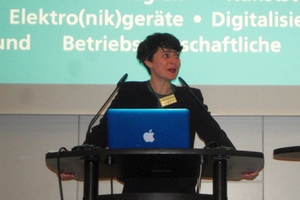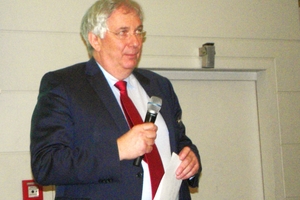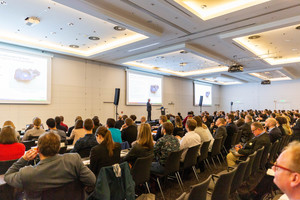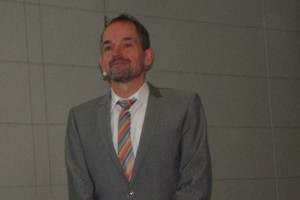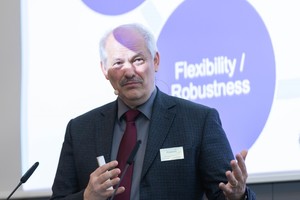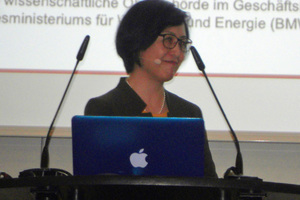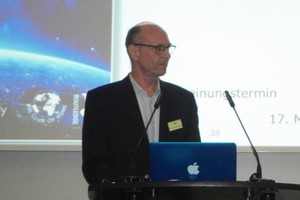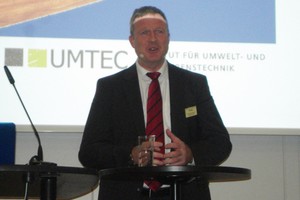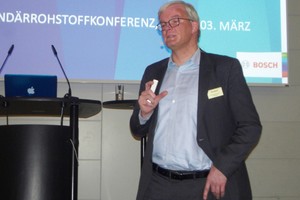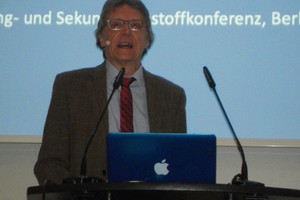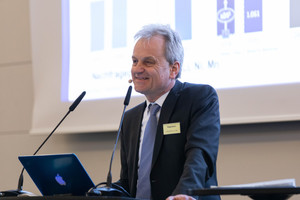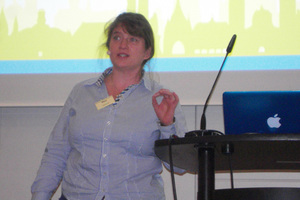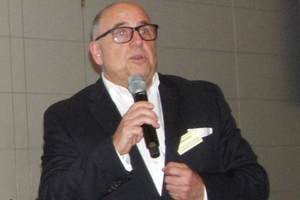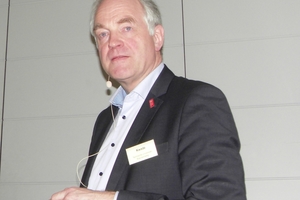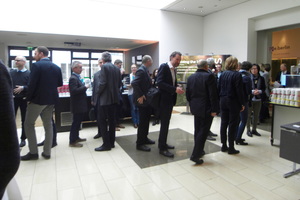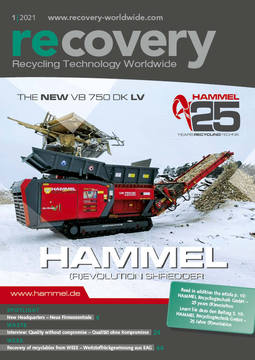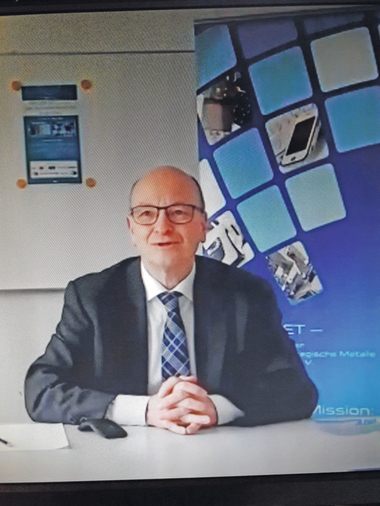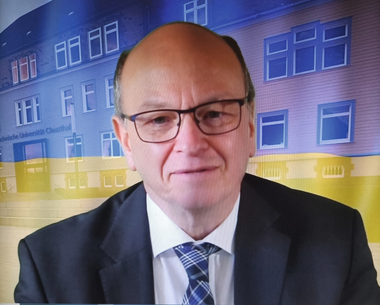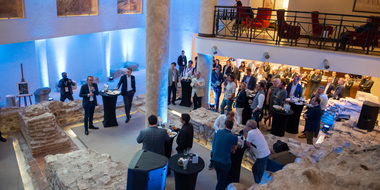Berlin Recycling and Secondary Raw Materials Conference 2020
Practical economic solutions for a resources-efficient circular economy, with the aim of conserving natural resources, continue to be an indispensable precondition for sustainability and climate protection at both national and global level. An important component here is provided by recycling efficiency and the effective use of secondary raw materials.
It is therefore no surprise that the previous Berlin Recycling and Raw Materials Conference has been correspondingly renamed and was devoted, on 2 and 3 March 2020, in a diversified manner to this subject. These dates proved, just a few days later, to be „just in time“, as the Corona crisis began to cast its initial shadow. Certain important players were, nonetheless, absent, including, for example, the chairman, Prof. Dr.-Ing. Daniel Goldmann, of the Clausthal University of Technology. Looking well ahead, this university-level institution, like the Technical University of Braunschweig, prohibited its staff to attend, for safety reasons. The organisers were, nonetheless, able to register some 290 attendees illustrating that interest in this annually occurring conference remains undiminished. The scientific leadership of the conference was entrusted to the tried-and-proven hands of Prof. Daniel Goldmann and Prof. Dr.-Ing. Dr. h. c. Bernd Friedrich, of the RWTH Aachen University.
Following the speech of welcome and the opening of the conference by Frau M. Sc. Elisabeth Thomé-Kozmiensky, CEO of Thomé-Kozmiensky Verlag GmbH, of Neuruppin, Dr.-Ing. Olaf Holm, of the same publishing house, responsible for the coordination of the conference programme, provided a brief introduction to the aims and the principal focuses of the conference: Recycling of plastics and batteries, Digitalisation, and Robotics.
Plenary session – Resources policy, strategy and legislation
The plenary session was subdivided into four core topics:
Resources and recycling efficiency
Politics and society
Sustainability
Circular economy
Unequivocal delineation of these topic complexes proved to be scarcely possible, and such subdivision really served, quite obviously, to improve the comprehensibility of the conference agenda.
Chaired by Prof. Dr.-Ing. Rüdiger Deike, of the University of Duisburg-Essen, Min. Dirigent Dr.-Ing. Christoph Epping, of the Federal Ministry for the Environment, Conservation and Nuclear Safety, Bonn, opened the first series of topics and spoke on „Current projects by this federal ministry in the field of the circular economy“. The speaker affirmed „No legislation – no recycling, but also: No technology – no recycling“, and went on to explain the numerous possibilities possessed by the state for influencing the „circular economy“. He also examined the potentials for regulation at international, European, national and municipal level, and the upcoming legal changes (e.g. the Basle Convention: Tightening of restrictions on the sale of and trade in plastic waste as from 1 January 2021, amendment of the German Closed Substance Cycle and Waste Management Act); in July 2020, the Act for Implementation of the EU Waste Framework Directive was to be passed. Further considerations were concerned with the EU Disposable Plastics Directive, which is to be implemented by July 2021.
Prof. Dr. Volker Steinbach, Federal Institute for Geosciences and Natural Resources, Hanover, spoke on the „Evaluation of risks in resources supply chains“, taking account of the entire procedure, from conception up to implementation. Although scarcely anybody suspected the entire scope of the Corona crisis at this point in time, Prof. Steinbach indeed forecast a severe influence on the economy and on the environment in his paper. A number of articles were cited to show how important risk evaluations are in the responsible assurance of resources supply chains. In addition to management systems within companies, international initiatives for the implementation of uniform test and inspection procedures and standards are in demand to an ever greater extent.
There was no lack of suggestions for enhancing recycling efficiency and using this term not only as a political catchphrase. The paper by Prof. Dr.-Ing. Dr. h. c. Bernd Friedrich, of the RWTH Aachen University, thus promised specific routes to the attainment of this aim: „Enhancement of recycling efficiency by means of thermal pre-treatment of complex resources flows“. This speaker was able to demonstrate that thermal pre-treatment can be incorporated into mechanical pre-treatment and thus permanently eliminate a whole series of undesirable constituents. Prof. Friedrich took three examples - Li-ion batteries, coated aluminium and PCBs – to illustrate the results achieved. His conclusion: this technology is cost-effective, despite the cost-causing extra processing operation, because the downstream processes then operate at significantly lower costs or are made at all possible by means of it (PCB: powder generation by means of pyrolysis).
Dr. Yun Schüler-Zhou, DERA Deutsche Rohstoffagentur, Berlin, spoke, under the heading of „Politics and society“ on the „Restrictions on importation of waste in China and the implication for the recycling market“. In addition to general observations on waste management and environmental policy in China, the practice was discussed citing the example of imported Cu scrap.
Prof. Dr.-Ing. Christian Berg, of Clausthal University of Technology, devoted his speech to the topic of sustainability („Why are we not sustainable and how can we become sustainable“) and ascertained: „Sustainability is, indeed, utopian, but we need it for orientation!“ The urgently necessary transition to a more sustainable society is to be targeted. In this context, a large range of barriers to sustainability must be mastered, and the speaker examined these in more detail and outlined methods for their overcoming.
Interesting deliberations on our ecological footprint were presented by Prof. Dr. Rainer Bunge, Rapperswil University of Applied Sciences, Rapperswil/Switzerland, in his paper on „Our problem: Too much money“. He ascertained, as an introduction, that the problem of humans is not that of waste, but instead that of consumption (the disposal of waste and waste-water contribute only 2.5 % of the human ecological footprint). Examples drawn from many fields of life (mobility, accommodation, food, and much more) illustrated how the environmental burden is affected by the purchase of products and services, with the conclusion: „The best purchase decision ecologically is not necessarily the process with the low eco-balance, but instead that which costs the most per harm caused.“ No doubt a little provocative but nonetheless providing a number of valuable insights into purchasing behaviour and its effects on the environment.
An elegant example of sustainable management was provided by Dr.-Ing. Martin Giersberck, of Robert Bosch GmbH, Renningen: „Urban Mining – sustainable plastics solutions at Bosch“. On 1 January 2020, the company formulated twelve strategic portfolios for Bosch Research, of which one was that of sustainability. Here, the focus on the field of plastics is important, since it will, even in future, not be possible to dispense with this material. The speaker examined, in particular, the upcycling of post-consumer waste, and also the recycling of plastics, with the focuses on dismantling (including, at present, the drafting of logistics concepts for dishwashers and washing machines), recycling of production waste, bio-plastics and other sustainable plastics solutions (e.g. replacement of polyamides by PP).
The use of a newly developed glass-fibre-reinforced recycling PP obtained from life-expired starter batteries has already proven successful. The use of ultrasonic-sensor enclosures in automotive electronics is approaching series production, with the saving of 2 120 t/a CO2 anticipated compared to new PP.
The interactions between „circular economy“ and „resources criticality“ were examined by Dr.-Ing. Luis A. Tercero Espinoza, of the Fraunhofer Institute for Systems and Innovation Research ISI, Karlsruhe. Starting from the definitions of the two terms, he examined the essential characteristics, such as diversity and stability of supply relations, product design and the role of recycling in the supply of resources. The author established very clearly that the change to the circular economy makes a significant contribution to the reduction of resources criticality and thus to assuredness of supply.
Within the topic complex of „Circular economy“, Dr. Helmut Löwe, Federal Ministry of Education and Research, Bonn, firstly presented the ministry‘s „ReziProK“ funding programme (with a project period of 2019 to 2021). Funding will amount to 30 million €, with industry contributing an additional 11 million €. The aim of the 25 joint projects is that of retaining the value of the products produced as long as possible in the economic cycle. Dr. Löwe is convinced: „The key term here is ‘use‘, rather than owning, i.e., the service-provider remains the owner.“ Further and future relevant Federal Ministry of Education and Research promotion projects were also examined; the focus will in future be on scale-up.
In his paper on the „Requirements for a circular economy in lithium-ion batteries, Dr.-Ing. Christian Hagelüken, of Umicore AG & Co. KG, Hanau-Wolfgang, illustrated the hurdles still existing here. He mentioned firstly, in his extremely elegant overview paper, the resources requirements for batteries and for electromobility. The latter is, in particular, the cause of greater demand for battery based-storage systems. And this, for its part, drives the needs for metals, Co, Ni, Li and Mn in particular, to drastic levels. There is, it is true, adequate geological availability, but concentration in the producer countries of the Congo and China is problematical. Increasingly, recycling provides an additional potential, as was earlier noted in the case of the Autocats. Dr. Hagelüken emphasised that the production of marketable, reusable recyclates will be essential for the circular economy (negative examples: SLF, fluff). Even now, the development of corresponding business models and the setting-up of corresponding return, reuse and recycling structures should be started, despite the fact that larger quantities of life-expired batteries and life-expired vehicles may be anticipated only as from around 2025.
Sibylle Meyer, of FairCup UG, Göttingen, examined a deposit-based returnable system involving high sustainability criteria: „FairCup – a Best Practice example for the applied circular economy“. A returnable beaker and lid in PE with no overprint has been developed and can be produced in various sizes, in order to attain pure-fraction recycling and thus „cradle-to-cradle“ utilisation. The beaker can be used at temperatures between –18 and +100 °C and can be reused up to one thousand times. This development should become widely popular, in view of the European packaging prohibition for plastics in 2021, since the beaker is easily recognisable without an overprint and can thus be handled automatically.
Specialist sessions
During the second day of the conference, participants had at their disposal, as at earlier conferences, a scientific agenda consisting of four sections and featuring more than forty specialist papers. In view of the current problems, the topic emphases had changed a little this year:
Plastics
Metals/Electronics Scrap
Batteries
Digitalisation and Robotics
Only a few technically orientated papers of the topic focuses and their authors can be briefly representatively examined, given the scope of this report.
Section: Plastics
There continues to be much going on in the field of plastics recycling, in view not only of the fact that the avoidance for this form of waste is a hotly discussed topic, but that ways of achieving this are also being sought. The majority of papers on plastics recycling and on the cyclical use of plastics originated from research institutions which are developing innovative solutions and are preparing for their launch in the recycling industry. Prof. Dr.-Ing. Bernd Meyer, of the TU Bergakademie Freiberg University of Resources, for example, examined the current status and new developments of the chemical recycling of plastics. He outlined the technical limitations of chemical recycling, provided an overview of the various available technologies (gasification, pyrolysis, solvolysis, plasma and oil-generation thermolysis) and made a process-engineering comparative assessment of them. He concluded that there is no single optimum process. It is necessary, instead, to assume that several processes will become established on the market – even not necessarily with competitive pressure, in view of the differing waste fractions and target products. Prof. Meyer proposed as a benchmark measure for the technological efficiency of chemical recycling processes the so-called carbon recycling rate (CRR), which encompasses the entire recycling chain, including subsidiary equipment, and results from the quotient of mass carbon in the target product and mass carbon in the feed material.
Prof. Dr.-Ing. Gilian Gerke, of Magdeburg-Stendal University of Applied Sciences, enquired concerning the recyclability of new materials and discussed the challenges made on sortability of composite materials and mixed waste fractions. A further four papers concentrated on sorting technologies for plastics. M. Sc. Franziska Meisel, TU Berlin, reported, for example, on how optimum particle sizes can improve the separation performance of high-quality plastics (quoting the example of plastics from electrical and electronic equipment), while Tobias C. Zisch, of REDWAVE, BT-Wolfgang Binder GmbH, of Eggersdorf/Austria, focussed on various IR-based sorting systems intended for this sector.
Section: Metals/Electrical and Electronic Scrap
A broad range of materials and processes were examined in the eleven papers of this section. The focus of these addresses was, on the one hand, sustainable recycling (example: Al beverage cans – Tom Rosenhagen, Novelis Sheet Ingot GmbH, Seeland) and, on the other hand, analysis for assessment of recycling quality (example: „Characterisation of metal scrap using multi-sensor systems“ by M. Sc. Max Kölking, Münster University of Applied Sciences). This year, again, there was no lack of papers on innovative preparation processes for closure of material cycles. Dr. Filipe Manjolinho Costa, of CRONIMET Envirotec GmbH, Wolfen Bitterfeld, illustrated, for example, the economic and ecological benefits of the use of vacuum-distillation and briquetting of metal sludges, powders and particulates to permit exploitation of the metals contained, while Dr. mont. Stefan Luidold, of the University of Leoben/Austria, reported on a new procedure for the hydrometallurgical valorisation of contaminated Cu from the recycling of electronic scrap. Other addresses on these subjects originated both from research institutions (e.g. that by Dr. rer. nat. Katrin Bokelmann, of Fraunhofer Research Institution for Materials Recycling and Resource Strategies IWKS Alzenau: „DISPLAY: Scaling-up of a process for recovery of materials from monitor-screen equipment and device-equipped PCBs“) and also from commercial companies (e.g. Dip.-Ing. Andreas Nolte, Aurubis AG, Lünen: „CENELEC 50625: Certified recycling of electrical/electronic scrap at Aurubis“).
Section: Batteries
Resulting from the fact that, with ever-growing electromobility, ever greater amounts of Li-ion batteries are being used and also, ultimately, are yielded later as life-expired batteries and recycled, this specialised section was this year allocated its own separate section. The enormous technical requirements, the high recycling rates for the functional metals, energy efficiency and the production of marketable products, and also the high safety standards and economic requirements involved, also necessitate continued Research & Development activities. As the chair, Dr. Hagelüken, noted, there are, as yet, no mature industrial recycling facilities, although an industrial pilot plant with a throughput of 7 000 t/a (combination of pyrolysis and hydrometallurgy) is in operation in Germany.
The eleven papers in this series dealt with the legal boundary conditions, with operational facilities for the recycling of batteries, the risks involved in the handling of Li batteries and current battery-development trends. „Current trends in battery development and the resulting challenges for recycling“ were reported, for example, by Prof. Dr.-Ing. Arno Kwade, TU Braunschweig, who also examined the latest generation of batteries, which make it possible to anticipate significant improvements in safety and substitute materials, and thus also in energy-efficiency and costs. One important finding is the fact that, in future, multiple battery technologies will exist on the market and that their separation prior to recycling will be of central importance.
In addition to the recovery of the various materials involved, it is, again and again, the high safety standards that are necessary to assure safe operation of recycling plants that are the focus of Research & Development. This was reported, among other speakers, by Dr.-Ing. Dr. Reiner Sojka, ACCUREC Recycling GmbH, Krefeld („Safe preparation of Li-based batteries by means of thermal conditioning“), Dipl.-Ing. Holger Kuhlmann, REDUX Recycling GmbH, Oberhausen („Safe operation of disposal facilities“) and Prof. Dr. mont. Roland Plomberger („Fire risks from Li-ion batteries: Are our plants insurable“).
Also worthy of mention is the paper by Dipl.-Ing. Eva Gerold, which focussed on the „Pyrometallurgical processing of intermediate products in battery recycling“. An extremely complex combination process consisting of hydrometallurgical and pyrometallurgical stages was selected which, on the one hand, resulted in easily saleable products but, on the other hand, generated a number of non-marketable intermediate products. This paper was keenly discussed and illustrated the broad bandwidth of difficulties which must be overcome to achieve a sustainable but nonetheless cost-effective mode of battery recycling.
Digitalisation and Robotics
Concluding remarks
Despite a number of cancellations by moderators and speakers as a result of the incipient Corona crisis, the organiser has nonetheless managed to put together an interesting and extremely diverse range of papers on the current problems of secondary resources and recycling topics and obtain highly competent speakers. The organiser‘s players deserve special thanks for the fact that the conference took place without difficulty but nonetheless with references to the modified conduct and organisationally excellent adaptation to changes implemented at short notice. This is indicative of the total professionality of the now thirteen years of existence of this conference. The subject emphases remain similar, focussing on the circular economy, recycling, resources efficiency and sustainability, and will remain the topics of the conference in the future, too, but the specialist part, in particular, can vary more or less from year to year. Electromobility, the development and recycling of batteries, as well as digitalisation and robotics were this year important topics which outlined not only the present-day status of Research & Development but also illuminated the legal boundary conditions and provided a realistic picture of the technical transfer of R&D results and the economic and organisational constraints which must be overcome. The attendance numbers demonstrated, this year, too, the great interest exhibited in this conference. It remains to be hoped that, despite the current inactivity in the economy and in research, and despite the effects of the Corona pandemic, the 14th Berlin Recycling and Commodity Conference can be held, as planned, in March 2021.
The majority of the papers are included in „Recycling and Resources“, Volume 13, ISBN 978 –3-944310-51-0 published by Thomé-Kozmiensky Verlag GmbH, Neuruppin 2020 or can be accessed via http://www.vivis.de/fachbuecher/recycling-und-rohstoffe/464-recycling-und-rohstoffe-band-13.

